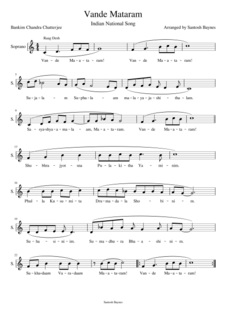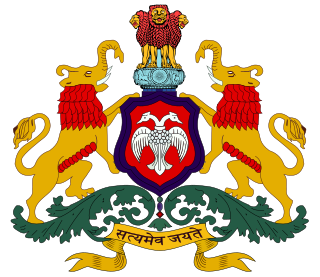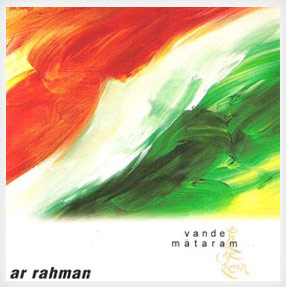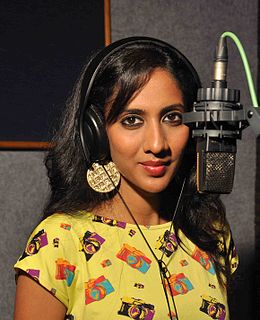
Jana Gana Mana is the national anthem of the Republic of India. It was originally composed as Bharoto Bhagyo Bidhata in Bengali by polymath Rabindranath Tagore. The first stanza of the song Bharoto Bhagyo Bidhata was adopted by the Constituent Assembly of India as the National Anthem on 24 January 1950. A formal rendition of the national anthem takes approximately 52 seconds. A shortened version consisting of the first and last lines is also staged occasionally. It was first publicly sung on 27 December 1911 at the Calcutta Session of the Indian National Congress.

Vande Maataram is a poem written in highly sanskritized Bengali by Bankim Chandra Chatterjee in 1870s, which he included in his 1882 Bengali novel Anandamath. The poem was first sung by Rabindranath Tagore in the 1896 session of the Indian National Congress. The first two verses of the song were adopted as the National Song of India in October 1937 by the Congress Working Committee prior to the end of colonial rule in August 1947.

Asha Bhosle is an Indian playback singer, entrepreneur and occasional actress and television personality who predominantly works in Indian Cinema. Known for her versatility, she has been described in the media as one of the most influential and successful singers in Hindi Cinema. In her career spanning over eight decades she has recorded songs for films and albums in various Indian languages and received several accolades including two National Film Awards, four BFJA Awards, eighteen Maharashtra State Film Awards, nine Filmfare Awards including a Lifetime Achievement Award and a record seven Filmfare Award for Best Female Playback Singer, in addition to two Grammy nominations. In 2000, she was honoured with the Dadasaheb Phalke Award, India's highest award in the field of cinema. In 2008, she was honoured by the Government of India with the Padma Vibhushan, the second-highest civilian honour of the country. Additionally she holds the Guinness World Record for the most studio recordings - singles.

Anand Math is a 1952 Indian Hindi-language historical drama film directed by Hemen Gupta, based on the famous Bengali novel Anandamath, written by Bankim Chandra Chatterjee in 1882. The novel and film are set in the events of the Sannyasi Rebellion, which took place in the late 18th century in Bengal. In a BBC World Service poll conducted in 2003 across 165 countries, the Vande Mataram song written by Bankim Chandra Chatterjee, composed by Hemant Kumar, sung by Lata Mangeshkar was voted 2nd in the "World's Top Ten" songs of all-time.
"Aye Mere Watan Ke Logo" is a patriotic song written in Hindi by Kavi Pradeep, composed by C. Ramchandra, and sung by singer Lata Mangeshkar. The song commemorates Indian soldiers who died during the Sino-Indian War in 1962.
Mehboob Alam Kotwal is a writer of Bollywood film song lyrics. He was born in the year 1961 in Bandra West, Mumbai and brought up in Mumbai city of Maharashtra, where he also received his primary education, first in English and later in Urdu.

Desh Premee is a 1982 Hindi action film directed by Manmohan Desai, starring Amitabh Bachchan in a dual role alongside an ensemble cast including Hema Malini, Navin Nischol, Parveen Babi, Shammi Kapoor, Premnath, Uttam Kumar, Parikshit Sahni, Amjad Khan and Sharmila Tagore. The film has musical score by Lakshmikant-Pyarelal duo.

Jaya Bharata Jananiya Tanujate is a Kannada poem, which was composed by the Indian national poet Kuvempu. The poem was officially declared the state song of the Indian state of Karnataka on 6 January 2004.

Subh Sukh Chain was the national anthem of the Provisional Government of Free India.
Bharath Bala is an Indian film director, screenwriter and film producer based in Chennai, Tamil Nadu.

Tamil Thai Valthu, also romanised as Thamizh Thaai Vaazhthu, is the State anthem of Tamil Nadu. The song was written by Manonmaniam Sundaram Pillai and composed by M. S. Viswanathan. Since the TN Government order issued on 23 November 1970, the official functions of the Government of Tamil Nadu and those functions organised by educational institutions and public establishments started with this song and ended with the Indian National Anthem. The song is sung daily in schools all over Tamil Nadu during the assembly at morning.

Vande Mataram is a 1997 studio album by Indian musician A. R. Rahman. It is Sony Music India's largest-selling non-film album to date. It released on 9 December 1997 by Sony's music labels Columbia Records and SME Records. It was released on the Golden Jubilee anniversary of India's independence and has been instrumental in instilling a sense of patriotic pride and national unity amongst the people of India. Ever since release, both the album and its title song "Maa Tujhe Salaam" have had a profoundly positive and unifying impact on the nationalistic and patriotic mood of the country. The album also features "Gurus of Peace" which Rahman recorded with the late Pakistani Qawwali singer Nusrat Fateh Ali Khan.
Bharoto Bhagyo Bidhata is a five-stanza Brahmo hymn in Bengali language dedicated to Supreme divine God who is the dispenser of the destiny of India. It was composed and scored in Bengali by Nobel laureate Rabindranath Tagore in 1911. The first stanza of the song has been adopted as the National Anthem of India.

Baiju Dharmajan is an Indian guitarist, music composer, producer and guitar tutor based out of Kochi, Kerala. A celebrated musician in his own country, Baiju had an extended stint during the 2000s as the lead guitarist of the Indian rock band Motherjane. He has been nicknamed the "God of Small Strings" by his fans. Baiju is particularly noted for his winding, Carnatic-inspired progressive rock and enduring guitar solos.

Masoom is a 1960 Indian Bollywood film directed by Satyen Bose. It stars Ashok Kumar, Sarosh Irani, Honey Irani, Ghanashyam Nayak and Mohan Choti. Screenwriter Ruby Sen won the Filmfare Award for Best Story. It was also nominated for a Filmfare Award for Best Movie. The music, by Robin Banerjee, includes songs such as 'Nani Teri Morni Ko Mor Le Gaye' and 'Humein Un Raahon Par Chalna Hai Jahaan Girna Aur Sambhalna Hai'.

Srimathumitha is an Indian playback and Carnatic singer who sings mainly in Tamil. She has also sung in Telugu, Hindi and Kannada songs. Some of her notable songs are "Azhage Azhage" from the Movie Oru Kal Oru Kannadi, "Valayapatti Thavile" from the movie Azhagiya Tamil Magan, "Kanaa Kaanum Kalangal" from the movie 7G Rainbow Colony, and "Rathathin Rathame" from the movie Velayudham. She is one of the leading playback singers in today's film music scenario. She has sung for leading music directors like Ilayaraja, Harris Jayaraj, Yuvan Shankar Raja, A. R. Rahman, Bharathwaj, Deva, S. A. Rajkumar, and Bharani. She emerged as the "Best Voice of 2002" in the TV Reality Show Rajageetham conducted by RAJ TV. She is the first playback singer to win the Vikadan Awards started in 2004, which was juried by late Sujatha. A. R. Rahman has featured her in 2 songs in the soundtrack of Oscar-winning movie Slumdog Millionaire.

Uttarakhand Devabhumi Matribhumi is the official state song of the Indian state of Uttarakhand. The song is written by Hemant Bisht and composed by noted Uttarakhandi folk singer and musician Narendra Singh Negi. This song is trilingual with first three of its seven verses written in Hindi, while the last four verses are written in Garhwali and Kumaoni languages.
Esther Lalduhawmi Hnamte is a child singer and prodigy from Mizoram, India. She became a media sensation in late 2020 when her rendition of A. R. Rahman's song "Maa Tujhe Salaam" went viral. She became the fastest viewer-gaining artists on YouTube among the Mizo people.

Sukanya Ramgopal is an Indian carnatic musician from Tamil Nadu. She is best known as the first woman ghatam player in Carnatic music. She is also proficient in carnatic vocal, violin, mridangam and veena. She received several awards including Sangeet Natak Akademi Award, Karnataka Sangeeta Nritya Academy Award and awards from Madras Music Academy, Chennai.













